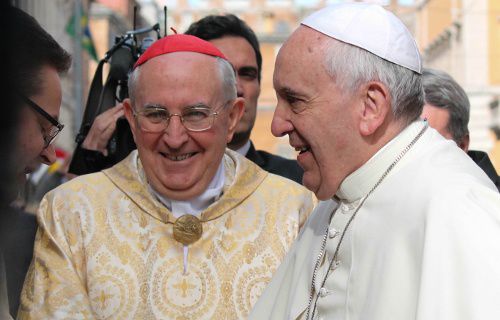In his Sunday homily delivered at a Polish parish in Rome, Pope Francis meditated on the presence of Jesus Christ in the Eucharist as a source of strength for Christians. The Pope reflected on the gospel account of the two disciples on the road to Emmaus who failed to recognize the risen Jesus Christ until he “broke bread” with them. Pope Francis said that the two became “witnesses of the hope that is Christ! Because they met him, the Risen Traveller.” “This Jesus, he is the Risen Traveller that journeys with us. And Jesus is here today, he is here among us. He is here in his word, is here on the altar, journeying with us,” the Pope preached at Rome’s St. Stanislaus Parish on May 4. “We too can become risen travellers if his word inflames our hearts, and his Eucharist opens our eyes to the faith and nurtures hope and charity in us,” urged the pontiff. Sunday’s Mass was held in celebration of John Paul II’s recent canonization on April 27. The Polish saint used to visit St. Stanislaus Church regularly throughout his time as Pope. “You, brothers and sisters, make part of a people that has been very much tried in its history. The Polish people know well that in order to enter into glory it is necessary to pass through the Passion and the Cross,” acknowledged Pope Francis. “And they know this not because they have studied it, but because they have seen it. St. John Paul II, like a worthy son of his earthly fatherland, followed this path. He followed it in an exemplary way.” “Are we ready to follow this path?” asked the Pope. True Christians are “travellers” rather than “vagabonds,” he explained, because they are “on a journey, but knowing where we are going!” Jesus accompanies his followers on the path, and his presence allows the faithful to “walk alongside our brothers and sisters who are sad and despairing, and warm their hearts with the gospel, and break with them the bread of fraternity.” The pontiff continued to reflect on these themes in the gospel during his Angelus message to the crowds filling St. Peter’s Square at noon on Sunday. “The road to Emmaus becomes like a symbol of our journey of faith: the Scriptures and the Eucharist are the indispensable elements for the meeting with the Lord,” he said in his noontime reflection. Like the disciples who were despairing at the death of the Lord, we “often arrive at Sunday Mass with our preoccupations, our difficulties and delusions.” “But the liturgy of the Word welcomes us,” just as Jesus explained the scriptures to the two disciples, “rekindling in our hearts the warmth of faith and hope.” In communion, stressed the Pope, Jesus “gives us strength.” “When you are sad, pick up the word of God. When you are down, pick up the word of God and go to Sunday Mass to receive communion, to participate in the mystery of Jesus. The word of God, the Eucharist: these fill with joy.” “Remember this well,” he urged, “every day, read a section of the gospel. And on Sunday, go receive communion, to receive Jesus. Like it was with the disciples on the road to Emmaus: they heard the word, they shared in the breaking of the bread.” Pope Francis then led the crowds in the traditional Easter-time Marian prayer, the Regina Coeli, asking for Mary’s intercession for “every Christian” to “rediscover the grace of a transforming encounter with the Lord.” At the close of his Sunday message, he also invited everyone to pray for the situation of violent political unrest in the Ukraine, and for the victims of a recent landslide in Afghanistan. The pontiff then greeted the various pilgrim groups present before wishing everyone a good Sunday and a good lunch.

